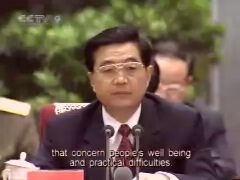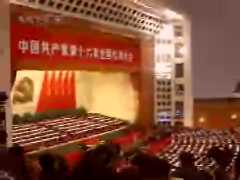 As the Communist Party of China marks its 82nd birthday, General Secretary Hu Jintao called on the Party and the nation as a whole to join a new campaign to study and implement the doctrine known as The Three Represents. Why did the CPC come up with the theory? And what does the theory mean to the party and the country? As the Communist Party of China marks its 82nd birthday, General Secretary Hu Jintao called on the Party and the nation as a whole to join a new campaign to study and implement the doctrine known as The Three Represents. Why did the CPC come up with the theory? And what does the theory mean to the party and the country?
Since the founding of the Communist Party of China (CPC) 82 years ago, three major theoretical achievements have been made to guide the party at different stages. Mao Zedong’s Thought combines Marxism with the practical situation of the Chinese revolution. The aim of Deng Xiaoping’s Theory is to build socialism with Chinese characteristics. And most recently, the “Three Represents” Theory first elaborated by then CPC General Secretary Jiang Zemin, marks another milestone for both the Party and nation building. Today, the new CPC leadership has reaffirmed its role as the guiding principle not only for party building but for the nation’s advancement as well.
Changing with the times is a phrase often quoted today by party officials and the general public. It reflects the CPC’s willingness to develop its theory according to the changing situation and to meet new challenges.
On July 1, 2003, the world’s largest political party, the CPC, celebrated its 82nd birthday. With only modest fanfare, General Secretary Hu Jintao marked the day by attending a small-scale symposium and delivered a key-note speech. Nonetheless, his speech caught the world’s attention. In his speech, he further elaborated on the Three Represents Theory and called on party members and the whole nation to earnestly study and implement the theory.
 “We dedicate ourselves to the interests of the public and to governing for the people’s benefit. This means we can’t just pay lip service. We must focus on the issues that directly affect the public and the ones that they are most concerned about. We must strike a balance between achieving the long term strategic goals of economic development and the immediate goals of raising the standard of living. There is nothing trivial about people’s interests. We will try our utmost to help solve problems that concern people’s well being and practical difficulties. We should always keep in mind people’s safety and their livelihood,” said General Secretary Hu Jintao.
“We dedicate ourselves to the interests of the public and to governing for the people’s benefit. This means we can’t just pay lip service. We must focus on the issues that directly affect the public and the ones that they are most concerned about. We must strike a balance between achieving the long term strategic goals of economic development and the immediate goals of raising the standard of living. There is nothing trivial about people’s interests. We will try our utmost to help solve problems that concern people’s well being and practical difficulties. We should always keep in mind people’s safety and their livelihood,” said General Secretary Hu Jintao.
Hu Jintao said the Three Represents theory fulfills the common wishes of the Chinese people and forms the foundation of nation building in the new century. He said the doctrine is built on previous socialist theories from Marxism to Deng Xiaoping’s Theory, and at the same time embodies the spirit of the time.
“The Three Represents Theory reflects the new conditions of our time and Maxism developed to suit China’s reality in the 21st century,” said General Secretary, Hu Jintao.
The “Three Represents” theory was first raised in 2000 by then General Secretary of the Central Committee of the CPC, Jiang Zemin. He was calling for strengthening the Party in the face of new challenges.
This theory was fully elaborated in 2001, in an address by Jiang Zemin marking the 80th birthday of the CPC.
Last November, at the 16th CPC National Congress, it was formally written into the Party Constitution. Since then, it’s been regarded as a major breakthrough and innovation in the Party’s core theory.
The 16th CPC National Congress ended with the new leadership of Hu Jintao as the general secretary of the CPC Central Committee. Less than a year since he was elected the Party chief and just over three months since the new government headed by Premier Wen Jiabao took office, Hu Jintao has declared the Three Represents not only as the guideline for the party but also for nation building. Hu Jintao said the theory would also be key to realize China’s strategic goal of achieving a comprehensive prosperous society by 2020. He also said the essence of the thought was that the CPC should dedicate itself to the interests of the public and governance for the people’s benefit.
According to Party history analysts, China’s new leadership has added details to the Three Represents theory to make it more systematic and practical.
Today, the CPC has around 76 million members nationwide. They account for 5 percent of China’s total population. Under the Three Represents theory, the Party has expanded its representation by recruiting new members from all social strata, including people from the ever-growing private sector. With the Three Represents theory well positioned as the guideline for both the Party and the nation, dogmatism is a thing of the past.
|